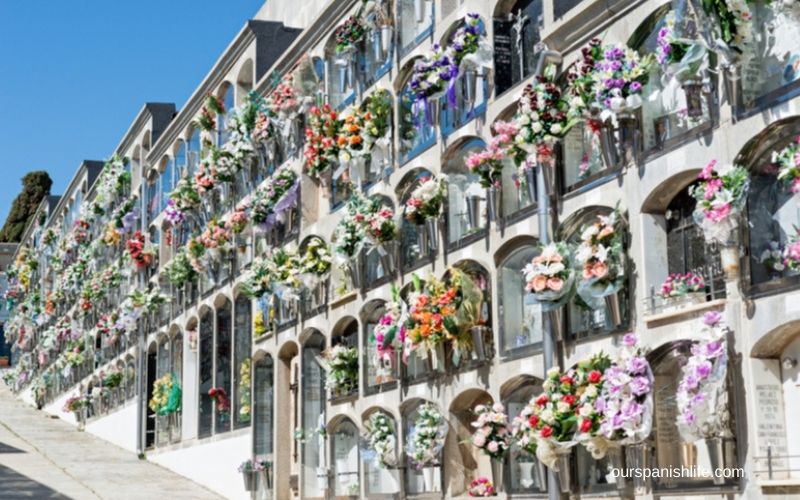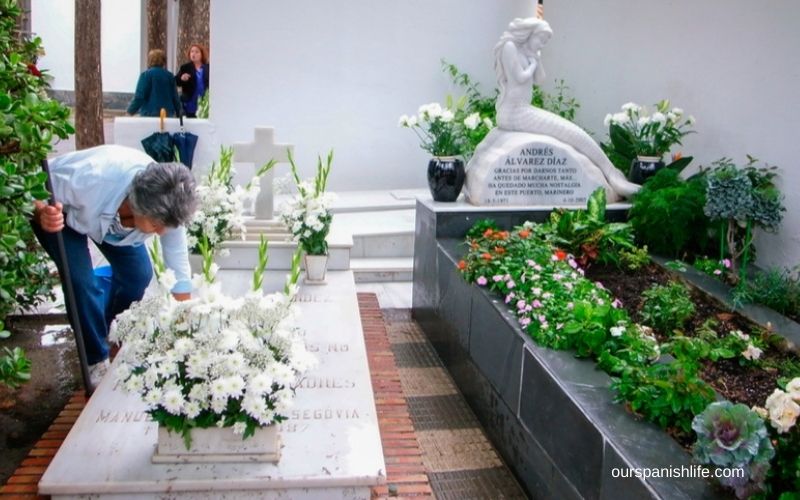
Halloween is the favorite time of year for many people, with it being a wonderful and spooky holiday that has its origins in pagan religions.
However, while Halloween is big in places such as the United States, and the United Kingdom, it isn’t quite the same in other parts of the world.
In other countries, rather than Halloween, they celebrate what is known as the Day of the Dead.
You might have heard about this from films such as “Coco”, or “the Book of Life” (both of which are animated and beautiful, we recommend a watch!)
However, Day of the Dead is always depicted as being a Latin American thing, specifically, a festivity and tradition that originates in Mexico.
But as Latin-American countries have a lot of traditions and holidays in common with Spain, you might be wondering whether Spain celebrates the Day of the Dead instead of Halloween. So…does it?
The answer is no. Although there are prominent communities in Spain that honor Latin American culture and traditions, and therefore celebrate the Day of the Dead, Spain itself does not have this as an official celebration, and it is not an event.
But here’s the thing, Spain doesn’t properly celebrate Halloween either. Sure, it’s becoming somewhat more popular, due to American and commercial influence.
But the true festivity that takes part in Spain, during this time of year, is Dia de Todos Los Santos (All Saints Day).
Contents
What is All Saints Day?
All Saints Day (el Dia de Todos Los Santos) is a national holiday and religious festivity celebrated in Spain every 1st of November. It has its origin in Christianity and is majorly celebrated by the Catholic Church.
And as Spain has a very big Catholic tradition within its culture, All Saints Day is the event celebrated instead of Halloween or other equivalents.
All Saints Day is all about honoring those that have reached God’s eternal Grace, or in other words, saints.
It is traditional for churches to host a special mass celebration, and for them to bring out relics of different saints to display, so that people may see them and pray to them.
It is also a day to celebrate the death of all loved ones, praying for their souls, and having faith that they too will have reached God.
Apart from attending mass, it is traditional for families to come together for a meal, and for them to visit the graves of loved ones.
On this day, people will place flowers and offerings on the graves of old family members and friends that have passed away, and they will remain there for a while, praying.
So basically, it is a solemn day of prayer and mourning, and of remembrance. Saints are a big part of Spanish culture, and as a matter of fact, most people are either named after a Saint or have a Saint’s name as their middle name!
It is also traditional to not only celebrate your birthday but your Saint name. So, for example, if you are called Roberto, then you celebrate the day of Saint Roberto on the 17th of September (as that is the day of Saint Roberto), and it is customary to receive a gift or congratulations.
(However, it is also important to remember that these are Catholic traditions, and younger generations do not follow them as much, so they are slowly becoming obsolete!)

What is the difference between Day of the Dead and All Saints Day?
All Saints Day is about remembering your dead loved ones, honoring the Saints, and placing flowers on graves. It sounds pretty similar to the Day of the Dead, right? At least in that family members will come together and visit the graves of their ancestors.
However, they are two completely different festivities. So what is the difference between them?
As mentioned, All Saints Day is celebrated on the 1st of November, originates in the Catholic Church, and it is about commemorating the Saints that have reached the Eternal Glory of God, and about remembering loved ones that have died.
The Day of the Dead is celebrated on the 2nd of November. It originates from a blend of the Spanish All Saints Day, and the Aztec pre-Hispanic roots of Mexico. It is about celebrating the dead and bringing the family together.
One of the main differences is that in Spain it is a day of somber mourning and remembrance. In Mexico and other Latin-American countries, it is a day of celebration, happiness, life, and color.
Two very different approaches to remembering the dead, and celebrating the spooky season!
Is Halloween celebrated in Spain?
Okay, so we have established that in Spain, they celebrate All Saints Day, which takes place on the 1st of November. It is a day of mourning, to commemorate the saints of the Catholic Church, and place flowers on your loved one’s graves.
But…what about Halloween?
Well, Halloween has become increasingly popular worldwide, due to American influence, and it is becoming a commercialized holiday.
There are many people in Spain that celebrate Halloween in some form, and in schools, there is usually a day in which kids can dress up, or learn about spooky things.
However, there is no trick or treating in Spain, and not that many people dress up. That is, except for students looking for an excuse to party!
In Conclusion
To sum this all up, Spain does not celebrate the Day of the Dead, as that is a Latin-American tradition that originated from Mexico.
Instead, Spain celebrates el Dia de Los Muertos, which translates into All Saints Day.
This takes place on the 1st of November, and it originates from the Catholic Church. It is all about commemorating Saints and laying flowers on the graves of the family’s loved ones.
Some people do celebrate Halloween, but this is more due to it has become a commercialized holiday, and it isn’t that widespread in Spain.
Related:
